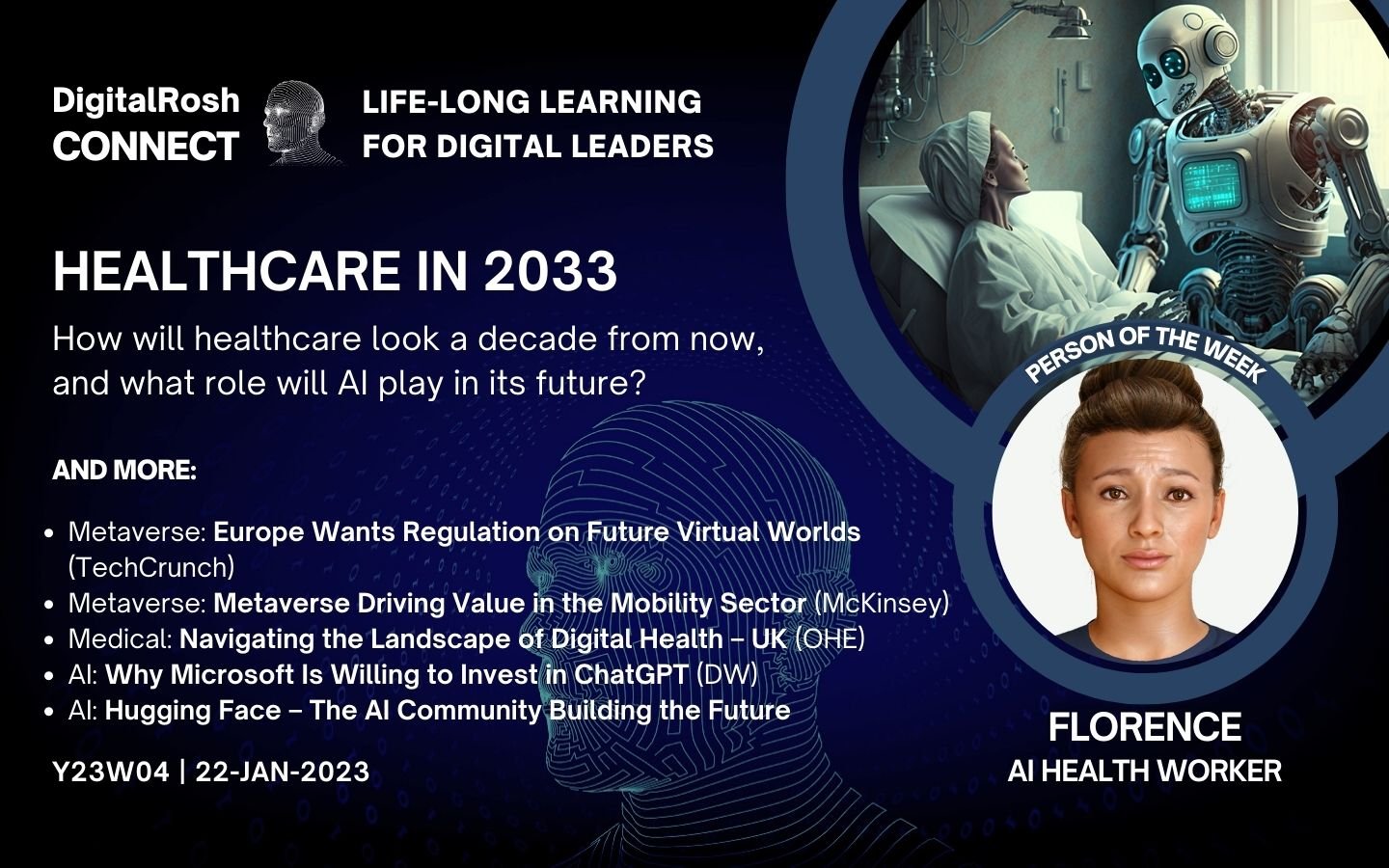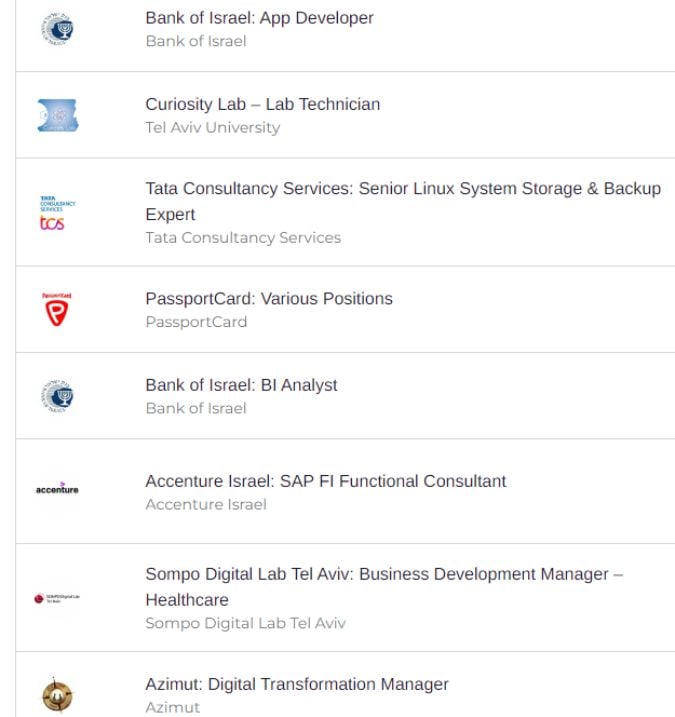Welcome to our latest edition of DigitalRosh CONNECT, where we dive into the impact of cutting-edge technology on various industries. From the European Commission’s plans to regulate and tax virtual worlds and the metaverse, to the use of AI health worker “Florence” to fight misinformation and provide health advice, we cover a wide range of topics that demonstrate the potential and challenges of advanced technologies. We also explore how digital health technologies are becoming increasingly important in healthcare and how shared mobility is a trend that is here to stay. Join us as we delve into the future of technology and its impact on the world around us.
In next week’s edition, you will find reports of our 2023 kickoff event in Israel on AGI, which took place on January 19. Worth waiting!
Wishing you all an enlightening learning,
Prof. Yesha Sivan, Founder, and CEO
& DigitalRosh team
(1) DigitalRosh > Corpus > Technologies > Metaverse
Europe Wants to Regulate on Future Virtual Worlds
The European Commission is planning to regulate and tax virtual worlds and the metaverse, which is a virtual reality world that users can interact with.
This initiative will be put forward in 2023 as part of the EU’s policy priorities, which aim to push for sustainability and digitalization.
The Commission is closely monitoring legal issues such as defining the applicable law, liability questions, and issues around digital assets in the metaverse. Additionally, the initiative has an economic aspect to it, as the Commission aims to impose network infrastructure taxes on the metaverse.
This move is in line with the bloc’s push for sustainability and digitalization and they plan to implement key pieces of the plan already agreed on.
(2) DigitalRosh > Corpus > Technologies > Metaverse
The Metaverse: Driving Value in the Mobility Sector (McKinsey)
The metaverse is the next iteration of the internet where people can immerse themselves in a digital world that closely mimics reality. The full-fledged metaverse will likely require at least five to ten years to materialize, but stakeholders in the mobility sector can already capture real business value from the “proto-metaverse” which is an early version of the metaverse.
The article by McKinsey examines how selected technologies, such as spatial computing and extended reality (XR) can help expand and diversify revenue streams in the mobility sector, enhance brand loyalty, improve customer experience, and optimize production through the use of metaverse.
The article gives examples of potential metaverse use cases in the mobility sector such as product engineering and design, manufacturing and procurement, marketing and sales, and product life cycle and mobility operations. The use of metaverse can benefit both the consumer and the distributor.
The mobility sector is also featured in another article by McKinsey, analyzing the market of shared mobility, which is when vehicles are shared among individuals over time or together among multiple passengers. The article presents projections for the market of shared mobility in 2030, including estimated global revenues and major trends for each segment of shared mobility based on varying levels of consumer adoption, regulatory support, and technological advancement.
(3) DigitalRosh > Corpus > Industries > Medical
Navigating the Landscape of Digital Health – UK
The Office of Health Economics (OHE) has published a report on the Digital Health Landscape in the UK. The report includes areas of regulation, value assessment and reimbursement, and efforts to increase the digital literacy of the general population and the health workforce.
The report provides lessons learned that may be of value to decision-makers beyond the UK who seek to get their health system digital-ready. It highlights that adding Digital Health Technologies to the wider portfolio of health technologies requires coordinated involvement from various stakeholders.
You might also want to listen to Mark Cotchia – an innovation, technology commercialization, and venture development leader at Baptist Health Innovations. He offers his predictions about the healthcare systems in the US in 2033 in the podcast Faces of Digital Health.
Cotchia predicts that interactions will be enabled by digital technologies but still mediated, guided, and led by humans. Personalized medicine will be commonplace, patients will be engaged and will demand customized experiences, and will finally have control over their health information.
(4) DigitalRosh > Corpus > Technologies > AI
Why Microsoft Is Willing to Invest in ChatGPT (DigitalRosh)
DW News discussed the potential for OpenAI ChatGPT and how it could be both exciting and frightening, with Prof. Yesha Sivan of DigitalRosh.
Microsoft is in talks to invest 10 Billion dollars in OpenAI – the creator of the artificial intelligence bot ChatGPT, which has received worldwide attention since its launch less than 2 months ago and gained its first million users in less than a week.
The bot’s ability to gather information and imitate human conversation has led to speculation that it could one day replace professional writers and even threaten Google’s search engine.
OpenAI, whose founders included Elon Musk, currently makes its money by licensing out its technology. Its main threat is in replacing the standard Google search: instead of getting several options and proposals to a question, people will just get the answer.
On 31-JAN-2023 at 18:00-20:00 (Israel time), DigitalRosh will hold a professional webinar: “Real-World AGI: Techniques and Best Practices”, hosted by Jacob Eilon and with the participation of Prof. Yesha Sivan (DigitalRosh) and Eyal Farkash (CTO, Accenture Israel). DigitalRosh Plus and Pro members are invited to attend free of charge.
(5) DigitalRosh > Corpus > Technologies > AI
Hugging Face – The AI Community Building the Future
Hugging Face is a community and data science platform that provides tools for building, training and deploying machine learning models based on open source code and technologies.
It is a place where data scientists, researchers, and machine learning engineers can come together and share ideas, get support, and contribute to open source projects.
It is notable for its Transformers library built for natural language processing applications, and its platform that allows users to share machine learning models and datasets.
The company was founded in 2016 as a chatbot app targeted at teenagers but later pivoted to focus on democratizing machine learning. In March 2021, they raised 40 million USD in a series B funding round.
(6) DigitalRosh > Corpus > Industries > Medical > AI in Medical
Person of the Week: Florence, an AI Health Worker (WHO)
The World Health Organization, with support from the Qatar Ministry of Health, launched the AI Health Worker, Florence version 2.0 at the World Innovation Summit for Health (WISH) in Qatar.
Florence offers an innovative and interactive platform to share a myriad of health topics in seven languages. The AI Health Worker can share advice on mental health, give tips to destress, provide guidance on how to eat right, be more active, and quit tobacco and e-cigarettes. Additionally, Florence 2.0 can also offer information on COVID-19 vaccines and more.
The AI health worker is now available in English with Arabic, French, Spanish, Chinese, Hindi, and Russian to follow. This initiative aims to fight misinformation around COVID-19, help people lead healthier lives, and fill in health information gaps that exist in many communities around the world.
The WHO plans to continue to develop the digital health worker to help meet major health issues facing the world today
To view these and other job postings, click on the image or visit – DigitalRosh > Corpus > Career > Job Board











